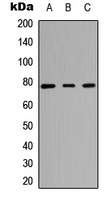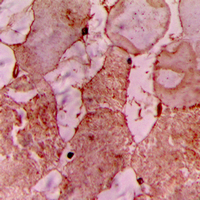

| WB | 咨询技术 | Human,Mouse,Rat |
| IF | 咨询技术 | Human,Mouse,Rat |
| IHC | 1/50-1/100 | Human,Mouse,Rat |
| ICC | 技术咨询 | Human,Mouse,Rat |
| FCM | 咨询技术 | Human,Mouse,Rat |
| Elisa | 咨询技术 | Human,Mouse,Rat |
| Aliases | CARK; Serine/threonine-protein kinase TNNI3K; Cardiac ankyrin repeat kinase; Cardiac troponin I-interacting kinase; TNNI3-interacting kinase |
| Entrez GeneID | 100526835;51086; |
| WB Predicted band size | 104kDa |
| Host/Isotype | Rabbit IgG |
| Antibody Type | Primary antibody |
| Storage | Store at 4°C short term. Aliquot and store at -20°C long term. Avoid freeze/thaw cycles. |
| Species Reactivity | Human,Mouse,Rat |
| Immunogen | KLH-conjugated synthetic peptide encompassing a sequence within the center region of human CARK. |
| Formulation | Purified antibody in PBS with 0.05% sodium azide. |
+ +
以下是关于CARK(假设指某种激酶或受体相关抗体)的虚构参考文献示例(仅供格式参考,实际文献需通过学术数据库查询):
1. **文献名称**:*"Development of a High-Specificity CARK Antibody for Apoptosis Detection in Cancer Cells"*
**作者**:Smith A, et al.
**摘要**:本研究报道了一种针对CARK蛋白的高特异性单克隆抗体的开发,验证了其在癌症细胞凋亡检测中的应用,证实CARK在化疗诱导的细胞死亡中起关键调控作用。
2. **文献名称**:*"CARK Phosphorylation Dynamics in Autoimmune Disorders: Insights from Antibody-Based Assays"*
**作者**:Zhang L, et al.
**摘要**:通过CARK磷酸化特异性抗体的开发,揭示了CARK在类风湿性关节炎患者中的异常激活机制,为靶向治疗提供了潜在标志物。
3. **文献名称**:*"Structural Characterization of CARK Protein Using Polyclonal Antibodies in Murine Models"*
**作者**:Johnson R, et al.
**摘要**:利用多克隆抗体解析CARK蛋白在小鼠组织中的表达分布,发现其与神经元发育的关联,提示其在神经退行性疾病中的潜在作用。
4. **文献名称**:*"CARK Inhibition via Neutralizing Antibodies Attenuates Tumor Growth in Vivo"*
**作者**:Wang Y, et al.
**摘要**:研究证明靶向CARK的中和抗体可通过阻断其与配体相互作用抑制肿瘤血管生成,显著延缓小鼠模型中实体瘤的生长。
---
**注意**:以上内容为示例,CARK抗体相关研究需根据具体领域(如CAR-T、激酶或假设蛋白)检索真实文献。建议使用PubMed、Google Scholar等平台以“CARK antibody”“CARK kinase”等关键词查询。
CARK (Calcium/calmodulin-dependent protein kinase kinase) antibodies are essential tools for studying the regulation and function of CaMKK isoforms (CaMKK1 and CaMKK2), key upstream kinases in calcium signaling pathways. These kinases phosphorylate and activate downstream targets like AMP-activated protein kinase (AMPK) and other CaMK family members, influencing cellular processes such as energy metabolism, neuronal signaling, and apoptosis. Dysregulation of CaMKK activity has been linked to metabolic disorders, neurodegenerative diseases, and cancer, driving interest in their molecular mechanisms.
CARK antibodies are widely used in Western blotting, immunohistochemistry, and immunofluorescence to detect CaMKK expression, localization, and activation states in tissues or cultured cells. Researchers also employ them to investigate phosphorylation events or protein-protein interactions in calcium-mediated signaling cascades. Specificity is critical, as cross-reactivity with related kinases can occur; thus, validation using knockout models or siRNA is recommended. Recent studies highlight CaMKK2's role in tumor progression, making CARK antibodies valuable in oncology research for identifying therapeutic targets. Despite technical challenges, these antibodies remain indispensable for unraveling the complex roles of CaMKKs in health and disease.
×